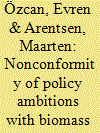|
|
|
Sort Order |
|
|
|
Items / Page
|
|
|
|
|
|
|
| Srl | Item |
| 1 |
ID:
105746


|
|
|
|
|
| Publication |
2011.
|
| Summary/Abstract |
Climate change mitigation and security of energy supply are important targets of Austrian energy policy. Bioenergy production based on resources from agriculture and forestry is an important option for attaining these targets. To increase the share of bioenergy in the energy supply, supporting policy instruments are necessary. The cost-effectiveness of these instruments in attaining policy targets depends on the availability of bioenergy technologies. Advanced technologies such as second-generation biofuels, biomass gasification for power production, and bioenergy with carbon capture and storage (BECCS) will likely change the performance of policy instruments. This article assesses the cost-effectiveness of energy policy instruments, considering new bioenergy technologies for the year 2030, with respect to greenhouse gas emission (GHG) reduction and fossil fuel substitution. Instruments that directly subsidize bioenergy are compared with instruments that aim at reducing GHG emissions. A spatially explicit modeling approach is used to account for biomass supply and energy distribution costs in Austria. Results indicate that a carbon tax performs cost-effectively with respect to both policy targets if BECCS is not available. However, the availability of BECCS creates a trade-off between GHG emission reduction and fossil fuel substitution. Biofuel blending obligations are costly in terms of attaining the policy targets.
|
|
|
|
|
|
|
|
|
|
|
|
|
|
|
|
| 2 |
ID:
112321


|
|
|
|
|
| Publication |
2012.
|
| Summary/Abstract |
The aim of the present paper is to characterize and analyze the emergence of the biodiesel industry in Brazil, and provide an assessment of the extent to which the goals established by the National Biodiesel Production and Usage Program have been reached. In relation to the goal of including biodiesel within the Brazilian energy matrix, the program can be seen to be responding dynamically and ahead of schedule. In 2010, the B5 blend was already part of the diesel consumed in Brazil, with 81% of the biodiesel coming from soybean oil and 14% from beef tallow. By contrast, the plans to diversify the feedstocks used to produce biodiesel and improve production in the poorest regions of Brazil have failed to prosper. Regarding the goal of fostering social inclusion by encouraging the participation of family-based farming, this has been partially achieved. Finally, the goal of cost-efficiently producing biodiesel is far from being achieved. The economic feasibility of the production and use of biodiesel in Brazil can be questioned since it is still strongly supported by tax incentives and production and marketing subsidies.
|
|
|
|
|
|
|
|
|
|
|
|
|
|
|
|
| 3 |
ID:
127209


|
|
|
|
|
| Publication |
2014.
|
| Summary/Abstract |
Numerous regional authorities within the European Union are committed to meet renewable energy targets in line with the EU-20-20-20 strategy. Energy from biomass occupies a pivotal position in the renewable energy strategy of many regions. Effective bioenergy policy often depends on an assessment of the regional resource potential for energy from biomass. Using the Dutch province of Overijssel as a case study, this study presents a biomass resource potential assessment, based on existing statistics and a resource-focused methodology, to determine the region's theoretical and technical potential. Additionally, a methodological framework is provided to translate the outcome of this biomass resource potential assessment into the policy domain, to allow the region's bioenergy policy ambition to be evaluated. The results indicate that Overijssel's potential bioenergy target is a share of 8.3%, which does not match with the desired policy target of 14%. It is therefore clear that it is unlikely that the province's bioenergy ambition will be met with the current supply of biomass, in the absence of additional policy measures. The outcome of the biomass resource potential assessment has therefore been used to deduce and recommend multiple policy measures.
|
|
|
|
|
|
|
|
|
|
|
|
|
|
|
|
|
|
|
|
|